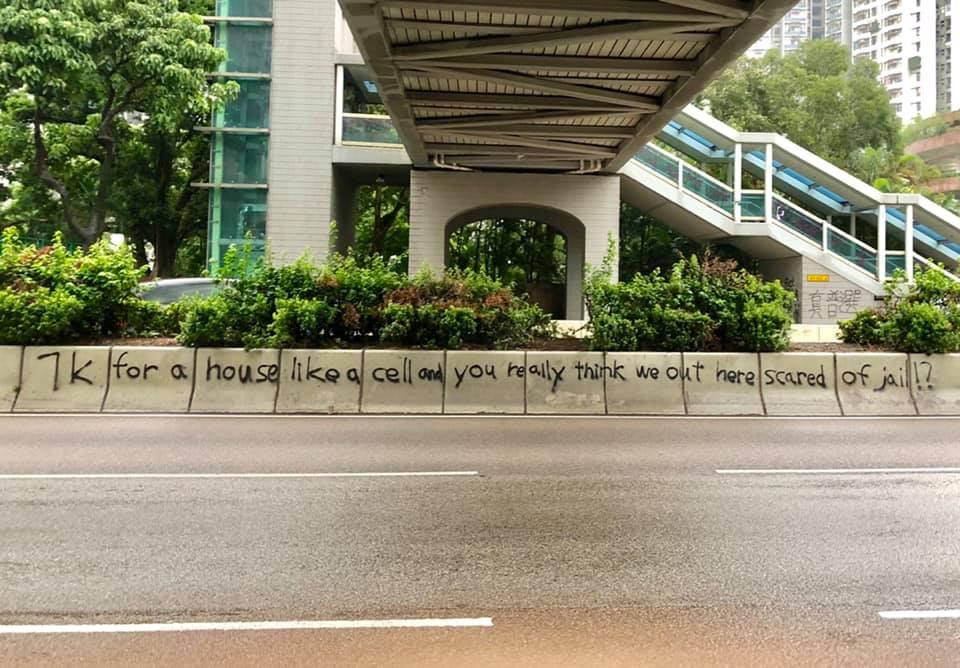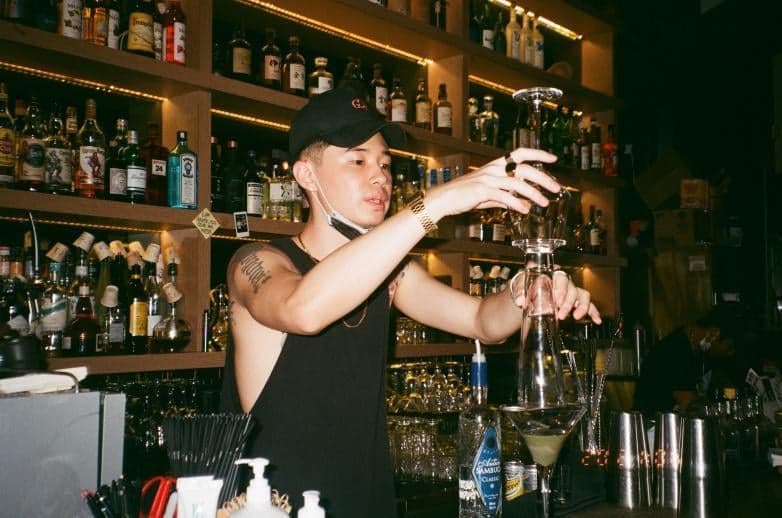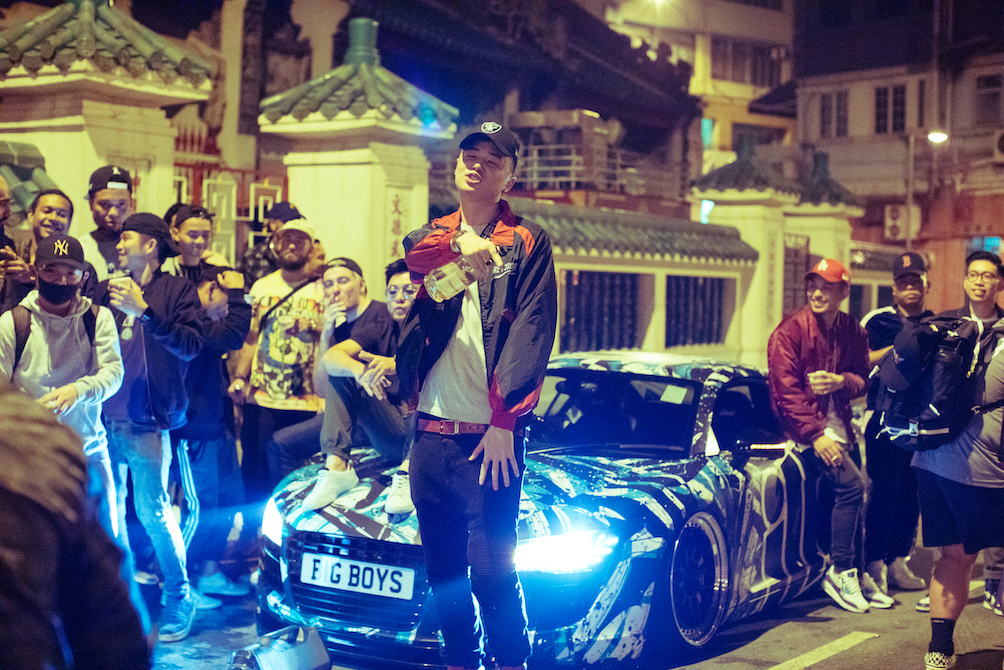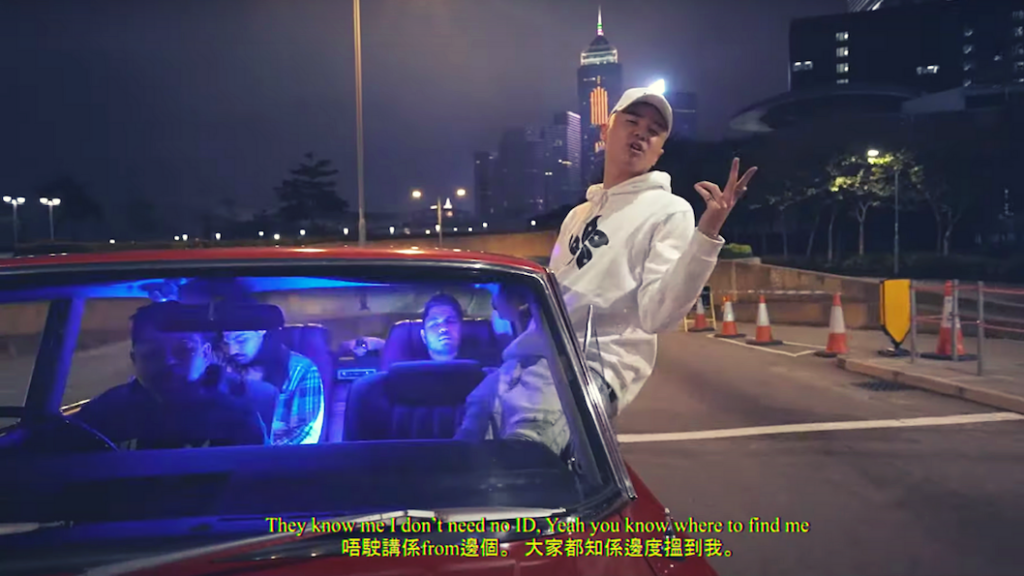Last year, as major protests swept across Hong Kong, one of the city’s key grievances was summed up in a neat graffiti scrawl.
“7k for a house like a cell and you really think we’re out here scared of jail,” the black lettering read.
Activist Joshua Wong shared a photo of the graffiti on Twitter. Online, Hongkongers liked and retweeted the post. Offline, many lived the grim reality it painted.

The graffiti isn’t just a clever half-rhyme. It’s a line written by TXMIYAMA in “5AM Minibus,” one of the Hong Kong-based rapper’s original tracks.
Specifically, the lyrics reflected the fact that he had just spent a sizeable chunk of his pay check for the tiny, 120 square feet flat he was renting for HK$7,000 (US$900) in Jordan.
On a balmy October evening, Coconuts visited TXMIYAMA in his natural habitat: a brightly lit, street art-filled Japanese izakaya that sits among the trendy bars of Soho.
The 27-year-old rapper is OZU’s bar manager. He works there at night and writes music into the early hours of the morning.

“My songs are about Hong Kong, about growing up here. I literally just rap about what I live,” he said. “I mean, I’m a bartender in the middle of Central.”
One of the most striking things about TXMIYAMA’s songs is how autobiographical they are. In one of his original tracks, “Hollywood Road,” he raps: “Work in food and beverage, gong lui (Hong Kong girls) want nothin’ to do with us” so “don’t never catch no feelings, ain’t no love in Lan Kwai.”
“Hollywood Road” is one of the standout tracks on TXMIYAMA’s debut album, “8 for 8.” Released in October, its album cover—a picture of him knocking back a HK$50 (US$6.50) bottle of Filipino brandy outside a 7-Eleven in Yau Ma Tei—captures how his generation of immigrants grew up in the city.
Born Yuri Tomiyama, the Canadian-born Japanese artist started rapping at 15. Using music as an outlet, he writes songs about his third culture identity, penning into lyrics his upbringing in Hong Kong. He weaves in stories about the city’s nightlife, juggling jobs, and the immigrant and refugee communities living in the shadows of skyscrapers.
On YouTube, some of his music videos—dark, but colorful productions shot in some of the grittier parts of town—have over 100,000 views.
“What inspires me about rap is that you can say anything you want,” Tomiyama explained. “When people sit down and listen to my rap, they’re like, wow this guy is actually talking about us.”
He counts old-school rappers like 2Pac, Nas, Biggie, The Notorious B.I.G. and Big L among his musical influences.
In the album’s opening track “Lean & Lomein,” one of the darker and more emotional songs, Tomiyama chronicles his addiction to pharmaceutical drugs and how he ate the cheap street food to get by: “I was leanin’ off codeine / back then they ain’t want me / dinner on the corner eatin’ lomein.”
“In Kwun Tong, and probably any other lower income area, pharmacists are just drug dealers,” Tomiyama said as he shook his head. “I was addicted to codeine and it took a near OD for me to go cold turkey.”

In “Immigrant,” also on the album, Tomiyama probes Hong Kong’s racialized class divides, rapping about how “my family is Asian so I am an immigrant, we ain’t enough to be expats” and that he “grew up in Jordan smelling like hash.”
“It was my life and I know it was the same for many of us,” Tomiyama explained. “Police checks, thrift shops, rooftops, angry chefs, drugs, alcohol, arcades, cyber cafes, pool halls, four of us sharing a box of cha siu faan (barbecued pork rice), you get the picture.”
Read more: Meet Isaac Chan, a Hong Kong singer-songwriter who finds healing through music
Working with local artists like Colombian refugee SEVENPRIMŒ and Filipino rapper MIKZ, Tomiyama sings of an aspiration shared among Hong Kong’s diverse population. “I just hope that the city love me like its own,” he raps in “Immigrants.”
After graduating from university in 2015 with a marketing degree, Tomiyama worked as a waiter at OZU. He then spent a year at a startup that bottled their own gin, where he was in charge of product development. At the same time, he continued working part-time at OZU while also picking up freelance copywriting work on the side.
After a year, he decided that office life wasn’t for him and returned to OZU, working his way up to bar manager.
“I am just naturally a night time person. I quite often found myself sleeping only three hours because I would be writing or recording music well into the night,” Tomiyama said. “My creative side wakes up as soon as the sun goes down.”
Tomiyama’s creative process usually follows a routine. After work, he travels from Central to Tsim Sha Tsui, gets a drink from 7-Eleven, puts in earphones and takes a long walk through neighborhoods like Prince Edward and Sham Shui Po. As he walks, he notes down his train of thoughts.
He has a modest studio set up in his sixth-floor walk-up apartment, where he writes and experiments with beats.
Laughing, Tomiyama described how his parents forced him to play the violin growing up. He said violin taught him how to read music, but his real interest came later.
“Somebody back in high school suggested I try to write rap and I just never stopped from there. Music is my escape. It keeps me sane.”

As Tomiyama’s reputation grows in the rap scene, his resolve to remain independent is unshaken.
“I’ve had decent label offers but it would mean that this music would become more of a job, not to mention I would have to answer to a manager.”
Tomiyama subtitles his music video, adding lyrics in English and colloquial Cantonese with the help of his friend, Manny, who is also OZU’s general manager. The bilingual lyrics are an ode to the city he’s called home since moving from Toronto in 2005.
When asked about his plans for the future, he said, “I don’t know what will happen to the city over the next few years. Hong Kong shaped my values. It’s how we grew up.”
The closing track “For the City,” a hardened love letter to Hong Kong, expresses Tomiyama’s raison d’etre as he raps: “Everything I do is for HK / I do it for the city, and I do it for the gang.”
Check out TXMIYAMA’s music on Spotify here.



Reader Interactions